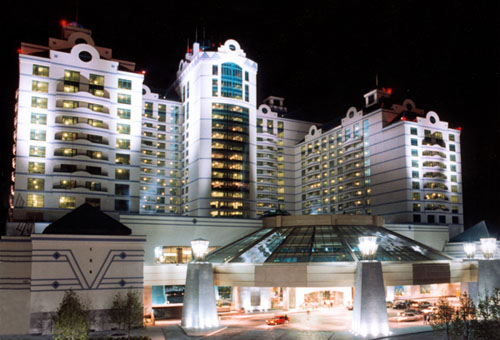Palermo: We can sway perception and policy
There is a nagging fear the "myth of the rich Indian" is prompting Congress, federal policy makers and bureaucrats with the U.S. Department of Interior and BIA to ignore the nation's trust responsibility for the more than 2.4 million citizens of more than 560 federally recognized tribes and Alaska Native villages; promises etched in treaties made in exchange for Native lives and lands.
American Indians still lag far behind non-Indians in every socio-economic category, from income to health care to housing to education. The impact of government gaming has been limited, according to the National Indian Gaming Commission, with 63 of 387 tribal gaming operations generating 71.5 percent of the revenues in 2006. Most tribal casinos are marginal enterprises providing jobs, but nowhere near the rivers of cash flowing from Foxwoods Resort, Mystic Lakes and other more lucrative operations.
Let me reiterate the point: There's a constant drumbeat of media linking Indians to casinos...implying they're rich, greedy, and corrupt...and suggesting they no longer need or deserve the treaty benefits owed them by the federal government. These perceptions lead government officials to ignore Indians.
What about all the media products, commercial products, and sports mascots that portray Indians as chiefs and warriors of the distant past? Don't these counteract the perceptions of Indians as rich casino owners? Not really. In fact, one could argue that these stereotypes contribute to the "rich Indian" myth.
How so? The prevailing view is that Indians flourished on the Plains in the 19th century, then tragically vanished. I.e., that Indians no longer exist today--or that they exist in a debased and degenerate form without ties to their traditional cultures. Hence today's Indians are little more than frauds and hucksters playing on America's guilt to get rich at the public's expense. They're not decent and honorable people with millennia of historical and cultural continuity who are struggling to survive in the modern world.


Writerfella here --
ReplyDeleteThere was another movie: REINDEER GAMES, about a plot to rob an Indian casino. Indian casinoes have been parts of the plot for PSYCH, Showtime's MASTERS OF HORROR, and even one of the LAW AND ORDER franchises.
The old myth of the Rich Indian was based on oil and gas leases in Oklahoma in the 1940s and 50s. writerfella experienced some of that himself when his family visited a relative in Billings, MT, in 1959. In a restaurant on a Sunday morning, the Bates' received only grudging service and we knew why. A park three blocks away was littered with passed-out Native drunks. But when Ma Bates asked the manager if she could put an American Indian Expo sign in the window, he said, "You're from Oklahoma?" Suddenly it was as if we were visiting royalty as they fell all over themselves trying to be nice to us. For all they knew, we were "rich Indians" from Oklahoma... *sigh*
All Best
Russ Bates
'writerfella'
I think we must acknowledge that there are indeed a number of tribes whose members have become wealthy from gaming. The San Manuel Band in Southern California pays a six figure monthly per capita, the Southern California Morongo chairman stated a year or two ago that the Tribe's per capita ranged between $15k and $20k per month, and that was before expansion of its casino. Similar amounts are paid to an impressive number of Tribes with casinos throughout California, although there are also a substantial number that are marginal. That said, tribes without gaming remain mired in poverty, notwithstanding provisions in California compacts for revenue sharing by casino tribes.
ReplyDeleteI read an article in the Newspaper that cited that tripe. :(
ReplyDeleteI don't know which "tripe" you mean, Nickname Unavailable.
ReplyDeleteDave Palermo, author of the article I posted, e-mailed me these thoughts:
It is an important issue, as you know. The issue of the image of Native America was the crux behind the Native Voices conference last year.
Thanks for picking up the ball...you do good work.
Re "there are indeed a number of tribes whose members have become wealthy from gaming": A relatively small number, maybe. Statistics say that only about a third of Indian casinos are making big money. Some of these don't distribute their profits to tribal members. And the 200-plus tribes that don't conduct gaming obviously aren't getting rich from it.
ReplyDeleteSo the majority of tribes aren't growing wealthy from casinos. How does that square with the media's frequent references to rich Indians? Answer: It doesn't.